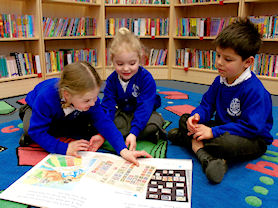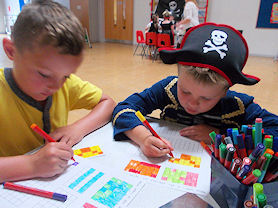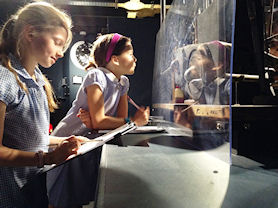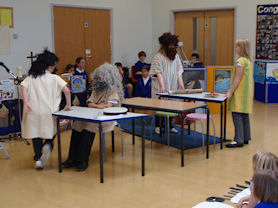Core Subjects
English

Reading big books in our library.
We aim to make the teaching of English engaging, creative and stimulating with the expectation that by the end of KS2 children are fluent readers and writers and confident speakers.
We teach Literacy skills in daily lessons, and use our skills in other subjects right across the curriculum.
We use the National Curriculum Framework which covers the essential areas of reading, comprehension and phonics (using the Twinkle Phonics scheme); writing, spelling, handwriting and grammar and speaking and listening.
A range of texts are studied to develop reading and writing skills.
A wide selection of books from various reading schemes (including Oxford Reading Tree and Project X) and children's literature, help to promote the development of reading.
- English Policy - 2023
- Reading Policy - 2023
- Reading Key Objectives - 2019/20
- Reading Learning Ladder
- EYFS Links to Reading Curriculum
- EYFS Links to Reading Comprehension Curriculum
- Writing Key Objectives - 2019/20
- Writing Learning Ladder
- EYFS Links to Writing Curriculum
Phonics and Spellings
- Phonics Policy - 2023
- Progression in Phonics
- Phase 1 Sounds Mat
- Phase 2 Sounds Mat
- Phase 3 Sounds Mat
- Phase 4 Sounds Mat
- Phase 5 Sounds Mat
- Reception High Frequency Words
- 100 High Frequency Words
- 200 High Frequency Words
- Years 1 and 2 Common Exception Words
- Years 1 and 2 Curriculum Spellings
- Years 3 and 4 Curriculum Spellings
- Years 5 and 6 Curriculum Spellings
English Schemes of Work
Our English scheme of work provides a structure of half termly units linked to the national curriculum, which staff use to plan termly, weekly and daily English lessons. The schemes for each year group outline the key objectives, outcomes and core texts central to the teaching and learning for each unit of work.
Even Years
- Year 1 - Autumn | Spring | Summer
- Year 2 - Autumn | Spring | Summer
- Years 3 and 4 - Autumn | Spring | Summer
- Years 5 and 6 - Autumn | Spring | Summer
Odd Years
- Year 1 - Autumn | Spring | Summer
- Year 2 - Autumn | Spring | Summer
- Years 3 and 4 - Autumn | Spring | Summer
- Years 5 and 6 - Autumn | Spring | Summer
English Progression in Text Types
We are passionate about providing and exposing children to high-quality age appropriate texts with increasing complexity across the year groups.
As a result of this approach, the children at Bidford on Avon Primary School develop a love of reading and a deeper understanding and confidence in their use of comprehension skills, vocabulary, grammar, spelling and punctuation. These skills are developed year on year allowing them to make progress as proficient readers and writers.
- Years 1 and 2 Progression in Text Types
- Years 3 and 4 Progression in Text Types
- Years 5 and 6 Progression in Text Types
Mathematics

Developing our skills on Pirate Maths Day.
We use the National Curriculum 2014 as the basis for teaching maths. This includes mental maths, numbers, shapes, measurement and data handling.
We give the children plenty of practical experience and time to apply their learning, reason mathematically and solve problems.
We make very good use of our excellent computer facilities for teaching and to reinforce learning using educational software.
Children are encouraged to apply their mathematical knowledge to science and other subjects.
- Mathematics Policy - 2023
- Calculations Policy: Addition and Subtraction
- Calculations Policy: Multiplication and Division
- Maths Key Objectives - 2019/20
- Maths Learning Ladder
- Times Table Chart
- EYFS Links to Maths Number Curriculum
- EYFS Links to Maths Numerical Patterns Curriculum
- EYFS Links to Maths Shape, Space and Measures Curriculum
Science

Exploring engineering in Science.
At Bidford School we aim to develop the children's knowledge and understanding of science within the three main areas of biology, chemistry and physics.
Children are able to develop inquiry skills through practical exploration linked to both curriculum topics and children's curiosity.
The science curriculum links to literacy, numeracy and computing.
- Science Policy - 2023
- Science Long Term Plan - 2023
- Science Knowledge Organiser - KS1
- Science Knowledge Organiser - Lower KS2
- Science Knowledge Organiser - Upper KS2
- EYFS Links to Science Curriculum
Religious Education (RE)

Children re-enacting a Bible story in RE.
As a Church of England Aided School, we aim to promote spiritual development and to learn about the distinct aspects of the Christian faith.
Collective worship and religious education are based on the Christian faith but the beliefs and traditions of other faiths are also covered.
Parents have the right to withdraw their children from the daily Act of Worship should they wish.
Special School Services are held termly at the parish church and parents are invited to attend these.
- Religious Education Policy - 2023
- Religious Education Long Term Plan - 2023
- Buddhism Knowledge Organiser
- Buddhism Progression Chart
- Christianity Knowledge Organiser
- Christianity Progression Chart
- Hindu Dharma Knowledge Organiser
- Hinduism Progression Chart
- Humanism Knowledge Organiser
- Islam Knowledge Organiser
- Islam Progression Chart
- Judaism Knowledge Organiser
- Judaism Progression Chart
- Sikhism Knowledge Organiser
- Sikhism Progression Chart
- EYFS Links to RE Curriculum